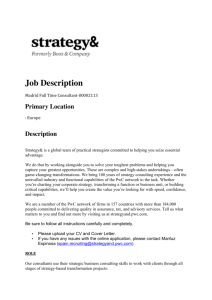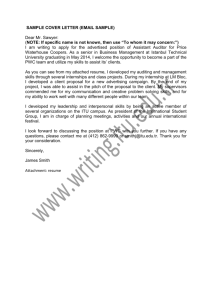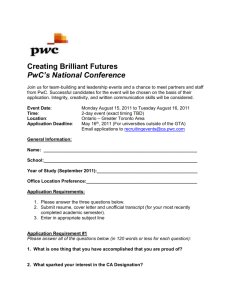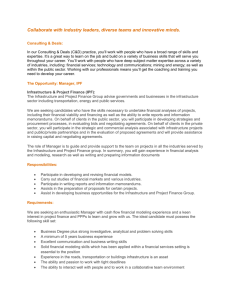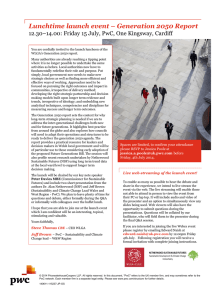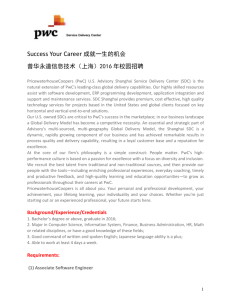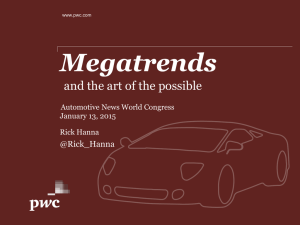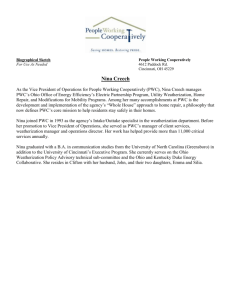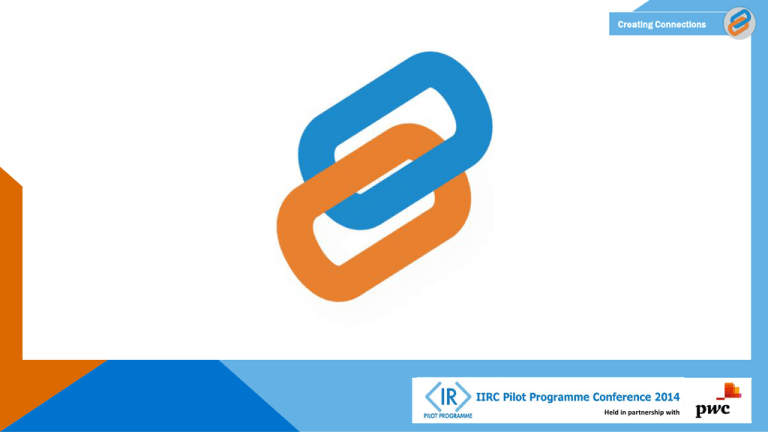
Creating Connections
Held in partnership with
Creating Connections
This document has been prepared for general guidance on matters of interest only, and does not constitute professional advice.
You should not act upon the information contained in this document without obtaining specific professional advice. No
representation or warranty (express or implied) is given as to the accuracy or completeness of the information contained in this
document, and, to the extent permitted by law, PwC, IIRC or their licensors do not accept or assume any liability, responsibility
or duty of care for any consequences of you or anyone else acting, or refraining to act, in reliance on the information contained
in this document or for any decision based on it.
Copyright 2014. All rights reserved. Permission is granted to make copies of these slides, provided that all logos, disclaimers,
copyright notices and acknowledgements on the slides are retained, and each copy bears the following credit line: "Copyright
2014. All rights reserved. Used with permission of the IIRC and PwC.“ In this document, PwC refers to the PwC network and/or
one or more of its member firms, each of which is a separate legal entity. Please see www.pwc.com/structure for further
details. IIRC refers to the International Integrated Reporting Council.
Acknowledgements of third party source materials are contained on the relevant slides.
Held in partnership with
Creating Connections
Creating Connections
E x p l o r i n g Tr u s t
How <IR> can help you be a trusted organization
Daniel Tisch
Immediate Past Chair, Global Alliance for PR and
Communication Management
CEO, Argyle Communications (Canada)
@DanTisch
Held in partnership with
Creating Connections
Overview and trust in today’s world
Helen Tuddenham
Learning and Behaviours leader, PwC
Held in partnership with
Creating Connections
Overview
Trust: what is it and why is it important?
What does it take for an organization to be trustworthy?
Who needs to trust you and what is important to them?
How you demonstrate that you are trusted?
How does managing trust work in the real world?
How can <IR> help you to build and sustain trust?
Held in partnership with
Creating Connections
The world today
Doing what is legal
Facebook manipulates user feeds
Google, Amazon and Starbucks: The rise of ‘tax
shaming’
02
Vs.
Puma SE: Environmental report
H&M: Paying global living wage
Doing what is right
Held in partnership with
Creating Connections
PwC 17th Annual Global CEO survey
More CEOS believe that trust levels have
improved in their industry than believe it
has deteriorated
Half of CEOs identified lack of trust as a
threat to their growth prospects (2013:
37%)
Held in partnership with
Creating Connections
What is trust and why is it important?
Helen Reeve Morris
Ethical Business Conduct Advisor, PwC
Held in partnership with
Creating Connections
Exploring trust
Group exercise
In table groups discuss the following questions:
•
What is trust?
•
What does it mean to you?
Be prepared to feedback
Held in partnership with
Creating Connections
What is Trust?
“Firm belief in the reliability, truth, or
ability of someone or something”
Oxford English Dictionary
Measure
Monitor
Report
Trust is earned by being trustworthy
Held in partnership with
Creating Connections
Business case for being trusted: Share price
Question: Which type of crisis had the
largest impact on the share price on day
one?
BEHAVIOUR
(more than 50% drop)
Operation
Information
Types of
crises
Behaviour
Corporate
Source: Freshfields Bruckhaus Deringer (2012). Knowing the risks, protecting your business: Crisis management. Accessed online:
http://www.freshfields.com/uploadedFiles/SiteWide/News_Room/Insight/Campaigns/Crisis_management/Knowing the risks interactive.pdf.PDF.
Held in partnership with
Creating Connections
Business case for being trusted: Innovation
The most innovative companies COLLABORATE three times more often than the least
innovative ones
What is one of the key barriers for not collaborating with other companies?
TRUST!
“GE Global Innovation Barometer”. Global Research Findings & Insights. GE, January 2013, http://www.ge.com/sites/default/files/Innovation_Overview.pdf
Source: “Breakthrough innovation and growth”, PwC, August 2013, www.pwc.com/innovation_survey.
Held in partnership with
Creating Connections
What does it take to be trustworthy?
•
•
•
•
Continuous focus
Adapt if needed
Transparency and honesty
Control distrust and demonstrate
trustworthiness
Measure
Monitor
Report
•
•
Culture and behaviour
Using key influencers
Held in partnership with
Creating Connections
The Trustworthy Organization©
Values
TRUST
Adapted from the “Trustworthy Organization” Dr Andrew Tucker
Held in partnership with
Creating Connections
Trust as a business asset
Question:
Who needs to trust your organization?
Held in partnership with
Creating Connections
How much trust is enough?
What is important to the following stakeholders?
-
(RED) Customers
-
(GREEN) Employees
-
(BLUE) Regulators
-
(YELLOW) Providers of financial capital (Investors)
-
(PINK) Media
Consider the question by reference to the trustworthy
organization and your business.
Held in partnership with
Creating Connections
Balancing the demands of all stakeholders
Engage in open and transparent
dialogue – use <IR> as a means to do
this
Recognise it is not possible to please
all stakeholders all of the time
Need to determine the “trust tipping
point” – how much trust is enough?
However, destroying trust with one
stakeholder group will quickly impact
others
Held in partnership with
Creating Connections
Case study: Nestlé
Held in partnership with
Creating Connections
Nestlé’s new narrative
Held in partnership with
Creating Connections
Integration & communication
Source: Nestle
Held in partnership with
Creating Connections
Correlation with reputation?
Nestle was ranked among world’s
10 most reputable companies
for the first time in 2013
Held in partnership with
Creating Connections
Key messages
The importance of trust in today’s world
Trust acts as a buffer and increases the risk resilience of an organization
Trust is tangible and requires management like any other asset - it can be
measured and monitored
Organizations can deliberately build / repair / sustain trust
<IR> provides a means to develop trustworthiness through transparency and
accountability in reporting
It is not easy to become trusted - but it is very easy to lose trust
Held in partnership with
Creating Connections
Held in partnership with

